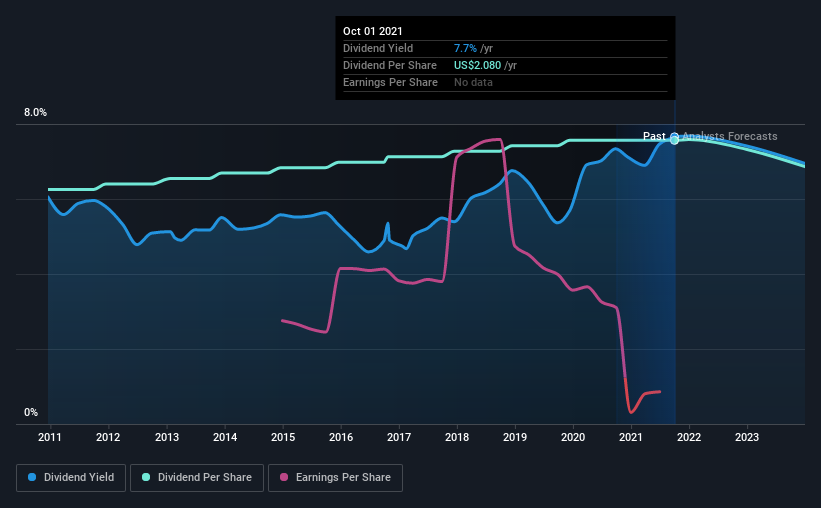It Might Not Be A Great Idea To Buy AT&T Inc. (NYSE:T) For Its Next Dividend
It looks like AT&T Inc. (NYSE:T) is about to go ex-dividend in the next 4 days. The ex-dividend date is one business day before a company's record date, which is the date on which the company determines which shareholders are entitled to receive a dividend. The ex-dividend date is an important date to be aware of as any purchase of the stock made on or after this date might mean a late settlement that doesn't show on the record date. Therefore, if you purchase AT&T's shares on or after the 7th of October, you won't be eligible to receive the dividend, when it is paid on the 1st of November.
The company's next dividend payment will be US$0.52 per share. Last year, in total, the company distributed US$2.08 to shareholders. Based on the last year's worth of payments, AT&T stock has a trailing yield of around 7.7% on the current share price of $27.16. Dividends are a major contributor to investment returns for long term holders, but only if the dividend continues to be paid. As a result, readers should always check whether AT&T has been able to grow its dividends, or if the dividend might be cut.
View our latest analysis for AT&T
Dividends are typically paid from company earnings. If a company pays more in dividends than it earned in profit, then the dividend could be unsustainable. AT&T paid a dividend last year despite being unprofitable. This might be a one-off event, but it's not a sustainable state of affairs in the long run. Considering the lack of profitability, we also need to check if the company generated enough cash flow to cover the dividend payment. If cash earnings don't cover the dividend, the company would have to pay dividends out of cash in the bank, or by borrowing money, neither of which is long-term sustainable. Over the last year it paid out 52% of its free cash flow as dividends, within the usual range for most companies.
Click here to see the company's payout ratio, plus analyst estimates of its future dividends.
Have Earnings And Dividends Been Growing?
Companies with falling earnings are riskier for dividend shareholders. Investors love dividends, so if earnings fall and the dividend is reduced, expect a stock to be sold off heavily at the same time. AT&T reported a loss last year, and the general trend suggests its earnings have also been declining in recent years, making us wonder if the dividend is at risk.
Another key way to measure a company's dividend prospects is by measuring its historical rate of dividend growth. Since the start of our data, 10 years ago, AT&T has lifted its dividend by approximately 1.9% a year on average.
We update our analysis on AT&T every 24 hours, so you can always get the latest insights on its financial health, here.
The Bottom Line
Is AT&T an attractive dividend stock, or better left on the shelf? First, it's not great to see the company paying a dividend despite being loss-making over the last year. On the plus side, the dividend was covered by free cash flow." With the way things are shaping up from a dividend perspective, we'd be inclined to steer clear of AT&T.
Having said that, if you're looking at this stock without much concern for the dividend, you should still be familiar of the risks involved with AT&T. Every company has risks, and we've spotted 2 warning signs for AT&T you should know about.
We wouldn't recommend just buying the first dividend stock you see, though. Here's a list of interesting dividend stocks with a greater than 2% yield and an upcoming dividend.
This article by Simply Wall St is general in nature. We provide commentary based on historical data and analyst forecasts only using an unbiased methodology and our articles are not intended to be financial advice. It does not constitute a recommendation to buy or sell any stock, and does not take account of your objectives, or your financial situation. We aim to bring you long-term focused analysis driven by fundamental data. Note that our analysis may not factor in the latest price-sensitive company announcements or qualitative material. Simply Wall St has no position in any stocks mentioned.
Have feedback on this article? Concerned about the content? Get in touch with us directly. Alternatively, email editorial-team (at) simplywallst.com.

 Yahoo Movies
Yahoo Movies 

